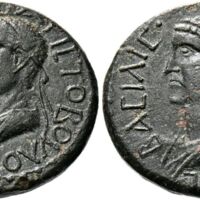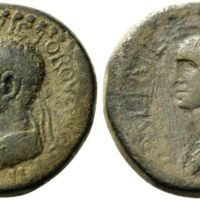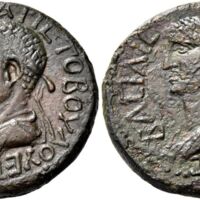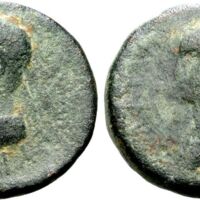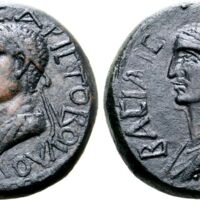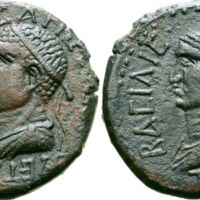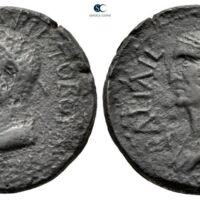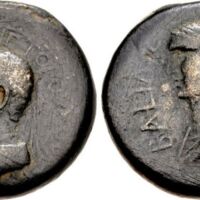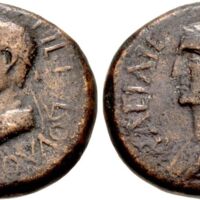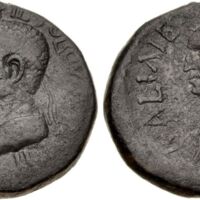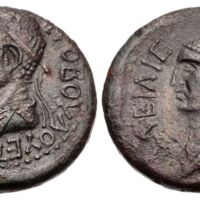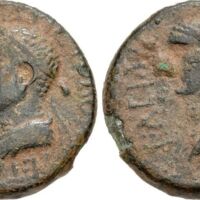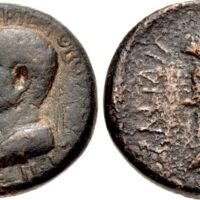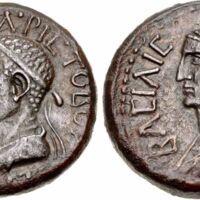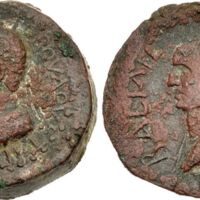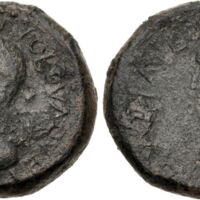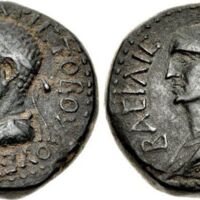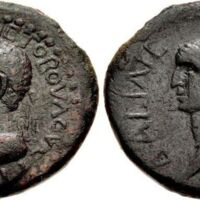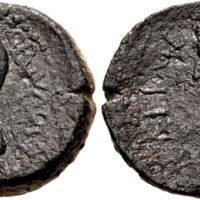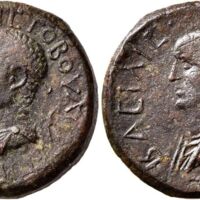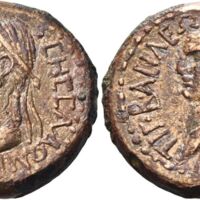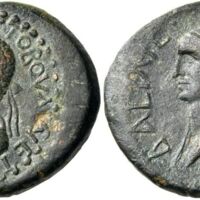Aristobulus of Chalcis - AE 4 chalkoi - Salome
Identifier
Kovacs-300; RPC-3840; ANRO-870
Reference Description
Aristobulus of Chalcis 54-71 AD
AE 8 chalkoi year 13 = 66/67 AD
Obv. ΒΑΣΙΛΕΩΣ ΑΡΙΣΤΟΒΟΥΛΟΥ ΕΤ ΙΓ
Bust of Aristobulus left, draped and diademed.
Rev. ΒΑΣΙΛΙΣΣΗΣ ΣΑΛΩΜΗΣ
Bust of Salome left, draped and diademed.
AE 8 chalkoi year 13 = 66/67 AD
Obv. ΒΑΣΙΛΕΩΣ ΑΡΙΣΤΟΒΟΥΛΟΥ ΕΤ ΙΓ
Bust of Aristobulus left, draped and diademed.
Rev. ΒΑΣΙΛΙΣΣΗΣ ΣΑΛΩΜΗΣ
Bust of Salome left, draped and diademed.
Recent Sales
| Auction | Date | Characteristics | Realized | |
| 39 | CNG e523 Lot 229 | 6-Sep-2022 | 20mm, 6.44g, 11h | $750 |
| 38 | CNG e518 Lot 234 | 14-Jun-2022 | 19mm, 6.03g, 11h | $2,750 |
| 37 | CNG 120 Lot 402 | 10-May-2022 | 21mm, 7.58g, 12h | $4,750 |
| 36 | CNG Triton XXV Lot 6131 | 25-Jan-2022 | 21mm, 6.96g, 11h | $2,250 |
| 35 | Nomos 23 Lot 161 | 29-Nov-2021 | 22mm, 7.32g, 11h | CHF 8,000 |
| 34 | Savoca 118 Lot 208 | 20-Nov-2021 | 21mm, 8.99g | EUR 1,600 |
| 33 | Leu 10 Lot 2208 | 23-Oct-2021 | 20mm, 7.00g, 12h | CHF 7,500 |
| 32 | CNG e501 Lot 121 | 5-Oct-2021 | 21mm, 8.96g, 12h | $3,000 |
| 31 | CNG e500 Lot 323 | 21-Sep-2021 | 20mm, 7.21g, 12h | $11,000 |
| 30 | CNG 118 Lot 328 | 12-Sep-2021 | 20mm, 6.18g,12h | $8,500 |
| 29 | CNG e499 Lot 271 | 31-Aug-2021 | 22mm, 10.25g, 11h | $800 |
| 28 | Leu Web 17 Lot 1287 | 13-Aug-2021 | 20mm, 4.38g, 12h | CHF 2,102 |
| 27 | CNG e497 Lot 322 | 3-Aug-2021 | 22mm, 5.35g, 12h | $1,200 |
| 26 | Savoca e108 Lot 215 | 30-Jul-2021 | 21mm, 6.72g | EUR 2,000 |
| 25 | CNG e496 Lot 179 | 20-Jul-2021 | 21mm, 5.82g, 12h | $4,500 |
| 24 | CNG e495 Lot 217 | 6-Jul-2021 | 20mm, 7.43g, 11h | $750 |
| 23 | CNG e495 Lot 218 | 6-Jul-2021 | 21mm, 7.68g, 12h | $600 |
| 22 | Nomos Auction 22 Lot 217 | 21-Jun-2021 | 20mm, 5.34g, 12h | CHF 36,000 |
| 21 | CNG e493 Lot 330 | 8-Jun-2021 | 20mm, 8.09g, 12h | $3,250 |
| 20 | CNG e492 Lot 217 | 25-May-2021 | 20mm, 6.53g, 11h | $4,750 |
| 19 | CNG 117 Lot 257 | 18-May-2021 | 20mm, 6.84g, 12h | $3,000 |
| 18 | Rauch e487 Lot 195 | 9-Mar-2021 | 19mm, 4.77g, 12h | $900 |
| 17 | CNG e484 Lot 388 | 26-Jan-2021 | 20mm, 6.61g, 12h | $10,000 |
| 16 | CNG Triton XXIV Lot 741 | 18-Jan-2021 | 20mm, 6.07g, 11h | $32,000 |
| 15 | NYS Auction LI Lot 21 | 11-Jan-2021 | 22mm, 9.98g | $52,500 |
| 14 | Roma e76 Lot 242 | 4-Nov-2020 | 20mm, 6.90g, 12h | EUR 750 |
| 13 | Roma XX Lot 157 | 28-Oct-2020 | 20mm, 6.00g, 1h | GBP 17,000 |
| 12 | Leu 7 Lot 1355 | 23-Oct-2020 | 20mm, 6.636g, 1h | CHF 13,000 |
| 11 | NAC 120 Lot 418 | 5-Oct-2020 | 8.90g | CHF 30,000 |
| 10 | Nomos Auction 20 Lot 306 | 9-Jul-2020 | 21mm, 5.83g, 12h | CHF 30,000 |
| 9 | CNG 114 Lot 367 | 12-May-2020 | 20mm, 6.35g, 12h | $6,000 |
| 8 | Heritage 3083 Lot 30092 | 23-Apr-2020 | 20mm, 6.78g, 12h | $17,400 |
| 7 | Roma XIX Lot 404 | 25-Mar-2020 | 20mm, 7.96g, 12h | GBP 38,000 |
| 6 | CNG Triton XXIII Lot 456 | 13-Jan-2020 | 21mm, 6.45g, 12h | $47,500 |
| 5 | Naumann 76 Lot 184 | 6-Apr-2019 | 21mm, 8.35g | Eur 4,000 |
| 4 | CNG 108 Lot 253 | 15-May-2018 | 22mm, 7.99g, 11h | $30,000 |
| 3 | Nomos Auction 13 Lot 234 | 6-Oct-2016 | 20mm, 8.12g, 12h | CHF 19,000 |
| 2 | CNG 103 Lot 347 | 13-Sep-2016 | 20mm, 5.61g, 12h | $17,000 |
| 1 | CNG Triton XIX Lot 277 | 4-Apr-2016 | 20mm, 9.13g, 11h | $160,000 |
Notes
Roma XIX Lot 404
Son of Herod of Chalkis and great-grandson of Herod I the Great, Aristoboulos hailed from the Herodian Dynasty of Roman vassal kings and in turn was granted the kingdom of Armenia Minor in AD 54 by the emperor Nero (Josephus \'Antiquities\', XX.158). Though uncertain, his wife Salome is often identified as the young woman whom the New Testament relates danced for Herod the Great and, at the encouragement of her mother, received the severed head of John the Baptist in return (Matthew 14:1-12; Mark 6:14-29). The martyrdom by beheading of John the Baptist is a holy day observed by various Christian churches, and a theme often seen in art, sculpture, music and poetry.
A loyal client king of Rome, Aristoboulos supported the general Gnaeus Domitius Corbulo in the Roman-Parthian War of AD 58-63, receiving a portion of Greater Armenia as reward, and in AD 73 supplied troops to the governor of Syria, Lucius Caesennius Paetus, who had persuaded the new emperor Vespasian that Antiochos IV of Commagene was planning to revolt and side with Vologases I of Parthia. Aristoboulos\' decision to strike coins in only two years of his reign, years 13 (AD 66/7) and 17 (AD 70/1), as asserted by Kovacs, noted by Hendin (pg. 275), and proven by the clear date on a coin from the only other known issue of Aristoboulos, that which features dual portraits of himself and Salome (cf. Triton XIX, 277 and RPC I, 3840) is significant. The years AD 66 and AD 70 mark the beginning and end of the First Jewish-Roman War, as commemorated in the reverse of the present type which refers to Titus, whom Vespasian had left to suppress the revolt while he himself made his bid for imperial power. The two issues, struck at the beginning and end of the war, honouring first Nero and now Titus, probably therefore represent a public reaffirmation of Aristoboulos\' loyalty to his Roman patrons.
Also king of Chalkis from AD 57 until his death in 92, whereupon the region was absorbed into the Roman provincial territories, a mint location in Chalkis has been cited as a possibility for the production of Aristoboulos\' coinage, though traditionally it has been noted as \'presumably\' being from Nicopolis-ad-Lycum, where a specimen was acquired by F. Cumont c. 1900. Given the close proximity of Chalkis to the war in Judaea and the notable similarity in appearance and fabric of these coins to those of Chalkis, a mint location in Chalkis cannot be discounted.
CNG Triton XXV Lot 6131
Salome is described in the Gospels (Matthew 14 and Mark 6) only as the daughter of Herodias, who asked Herod Antipas for the head of John the Baptist in return for her daughter’s risqué dance for the king. Salome’s name is supplied by Josephus in Antiquities 18.5, where he also informs us that she grew up to marry her great-uncle Philip the Tetrarch and, after Philip’s death, her cousin Aristoboulos, who is featured on the obverse of this coin and with whom Salome had three sons. Aristoboulos was the son of Herod V of Chalkis and great grandson of Herod I, and was appointed king of Armenia Minor in the first year of Nero’s reign.
The present issue was struck in 66/7 CE (year 13 of Aristoboulos’ reign), the first year of the Jewish war and around 40 years since the execution of John the Baptist, which has been tentatively dated to some time between 25 and 29 CE. Hendin (5th ed., p. 275) suggests that Aristoboulos struck this issue for propagandistic and political purposes, in the first year of the war, as a show of loyalty to Rome and his patron Nero.
When RPC was published, citing three known examples of this type, the date was off the flan on two pieces and the one example with partial date had been tentatively read as date Α or Η (RPC p. 570). Frank Kovacs subsequently discovered an example with a clear date 13 (Hendin p. 275, pl. 24, same obverse die as the present coin), and Kovacs’ opinion was that other reported dates were most likely mis-readings of that date. The publication of additional specimens has since confirmed Kovacs’ opinion, and it is now clear that all coins of this type are dated year 13.
Son of Herod of Chalkis and great-grandson of Herod I the Great, Aristoboulos hailed from the Herodian Dynasty of Roman vassal kings and in turn was granted the kingdom of Armenia Minor in AD 54 by the emperor Nero (Josephus \'Antiquities\', XX.158). Though uncertain, his wife Salome is often identified as the young woman whom the New Testament relates danced for Herod the Great and, at the encouragement of her mother, received the severed head of John the Baptist in return (Matthew 14:1-12; Mark 6:14-29). The martyrdom by beheading of John the Baptist is a holy day observed by various Christian churches, and a theme often seen in art, sculpture, music and poetry.
A loyal client king of Rome, Aristoboulos supported the general Gnaeus Domitius Corbulo in the Roman-Parthian War of AD 58-63, receiving a portion of Greater Armenia as reward, and in AD 73 supplied troops to the governor of Syria, Lucius Caesennius Paetus, who had persuaded the new emperor Vespasian that Antiochos IV of Commagene was planning to revolt and side with Vologases I of Parthia. Aristoboulos\' decision to strike coins in only two years of his reign, years 13 (AD 66/7) and 17 (AD 70/1), as asserted by Kovacs, noted by Hendin (pg. 275), and proven by the clear date on a coin from the only other known issue of Aristoboulos, that which features dual portraits of himself and Salome (cf. Triton XIX, 277 and RPC I, 3840) is significant. The years AD 66 and AD 70 mark the beginning and end of the First Jewish-Roman War, as commemorated in the reverse of the present type which refers to Titus, whom Vespasian had left to suppress the revolt while he himself made his bid for imperial power. The two issues, struck at the beginning and end of the war, honouring first Nero and now Titus, probably therefore represent a public reaffirmation of Aristoboulos\' loyalty to his Roman patrons.
Also king of Chalkis from AD 57 until his death in 92, whereupon the region was absorbed into the Roman provincial territories, a mint location in Chalkis has been cited as a possibility for the production of Aristoboulos\' coinage, though traditionally it has been noted as \'presumably\' being from Nicopolis-ad-Lycum, where a specimen was acquired by F. Cumont c. 1900. Given the close proximity of Chalkis to the war in Judaea and the notable similarity in appearance and fabric of these coins to those of Chalkis, a mint location in Chalkis cannot be discounted.
CNG Triton XXV Lot 6131
Salome is described in the Gospels (Matthew 14 and Mark 6) only as the daughter of Herodias, who asked Herod Antipas for the head of John the Baptist in return for her daughter’s risqué dance for the king. Salome’s name is supplied by Josephus in Antiquities 18.5, where he also informs us that she grew up to marry her great-uncle Philip the Tetrarch and, after Philip’s death, her cousin Aristoboulos, who is featured on the obverse of this coin and with whom Salome had three sons. Aristoboulos was the son of Herod V of Chalkis and great grandson of Herod I, and was appointed king of Armenia Minor in the first year of Nero’s reign.
The present issue was struck in 66/7 CE (year 13 of Aristoboulos’ reign), the first year of the Jewish war and around 40 years since the execution of John the Baptist, which has been tentatively dated to some time between 25 and 29 CE. Hendin (5th ed., p. 275) suggests that Aristoboulos struck this issue for propagandistic and political purposes, in the first year of the war, as a show of loyalty to Rome and his patron Nero.
When RPC was published, citing three known examples of this type, the date was off the flan on two pieces and the one example with partial date had been tentatively read as date Α or Η (RPC p. 570). Frank Kovacs subsequently discovered an example with a clear date 13 (Hendin p. 275, pl. 24, same obverse die as the present coin), and Kovacs’ opinion was that other reported dates were most likely mis-readings of that date. The publication of additional specimens has since confirmed Kovacs’ opinion, and it is now clear that all coins of this type are dated year 13.
See All Items in Category
Citation
“Aristobulus of Chalcis - AE 4 chalkoi - Salome,” Armenian Numismatic Research Organization, accessed April 26, 2025, https://armnumres.org/items/show/870.


